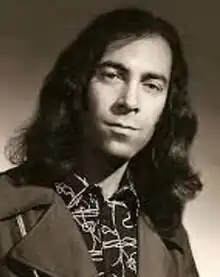Erkin Koray
Mustafa Erkin Koray (Turkish pronunciation: [æɾkin ˈkoɾaj]; 24 June 1941 – 7 August 2023) was a Turkish musician, singer and guitar player, active in Anatolian rock.[1]
Mustafa Erkin Koray | |
|---|---|
 | |
| Background information | |
| Born | 24 June 1941 Kadıköy, Istanbul, Turkey |
| Died | 7 August 2023 (aged 82) Toronto, Ontario, Canada |
| Genres | |
| Instrument(s) | |
| Years active | 1957–2023 |
| Labels | |
| Website | erkinkoray |
Life and career
Koray was active in the Turkish folk music scene since the late 1950s. In 1957, he and his band began playing covers of Elvis Presley and Fats Domino.
In 1967, he released his first psychedelic single "Anma Arkadaş". Koray followed this with a number of singles, both by himself and in collaboration with others.
In the early 1970s, he formed the group Ter ("Sweat"), with former members of the band Bunalım (Group Depression). They only recorded one single, "Hor Görme Garibi", before breaking up. In 1973, his first album, Erkin Koray, was released, with singles from 1967 to 1973. He left Istanbul Records after the release of the album and, in 1974, signed with Doglan Records, which released his dabke single "Şaşkın".
In 1974, Koray released the LP Elektronik Türküler (Electronic Folk Songs [of Turkey]). In Turkish music circles he is often referred to as Erkin Baba ("Erkin the Father") for his pioneering influence on Turkish popular music. Other hits by Koray are "Fesuphanallah", "Istemem", "Sevince", "Öyle Bir Geçer Zaman ki", "Estarabim", "Arap Saçı", "Yalnızlar Rıhtımı", "Akrebin Gözleri", and "Çöpçüler".
Koray was the inventor of the electro baglama, the electrified version of a traditional Turkish musical instrument related to the lute.[1]
Erkin Koray died on 7 August 2023, at the age of 82.[2]
Discography
- Studio albums
- Erkin Koray (1973)
- Elektronik Türküler (1974)
- 2 (1976)
- Erkin Koray Tutkusu (1977)
- Benden Sana (1982)
- İlla Ki (1983)
- Ceylan (1985)
- Gaddar (1986)
- Çukulatam Benim (1987)
- Hay Yam Yam (1989)
- Tamam Artık (1990)
- Gün Ola Harman Ola (1996)
- Devlerin Nefesi (1999)
See also
References
- Karaege, Vefik. "Biography: Erkin Koray". Allmusic. Archived from the original on 20 March 2023. Retrieved 20 July 2010.
- "Turkish rock legend Erkin Koray dies at age of 82". Daily Sabah. 7 August 2023. Retrieved 7 August 2023.